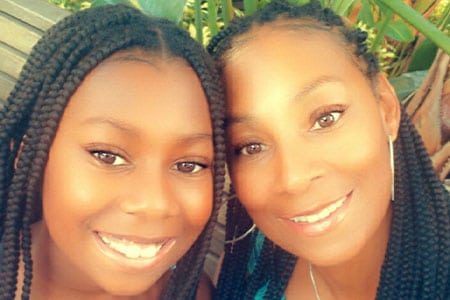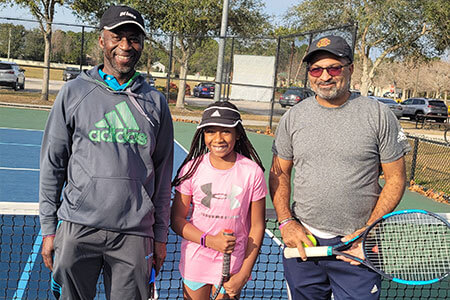USTA Florida is celebrating Black History Month this February by shining the spotlight on members of the vast Florida tennis community. Chantel Day is a tennis mom, volunteer, and advocate for Black history. She loves teaching her daughters about their heritage because she believes, “these history lessons and the historical lineage not only ignite pride, but they also show our children that they, too, can be successful in this sport.”

What is your name? Chantel Day
Birthplace? Richmond, Virginia. The birthplace of the great Arthur Ashe.
Current city? Port Orange, FL
What your current role (job), what you do, and how it is related to tennis? Currently, I’m volunteering with Derbyshire Community Tennis (DCT), Inc. in partnership with the Daytona Beach Chapter of Jack and Jill of America, Inc. to provide educational programs for the youth at the tennis center. Both organizations are predominately African American and have partnered together to serve this disadvantaged community. We provide afterschool tutoring, educational and life-skills curriculums including but not limited to financial literacy, mental and physical health, and college preparedness. While we love that the children are being introduced to the sport of tennis, we always focus on and emphasize the importance of academics.
How did you get involved in tennis? My youngest daughter, Sage, took an interest in tennis approximately 4 years ago. So, I signed her up for the Port Orange Parks and Recreation Youth Tennis Program. Ironically, there weren’t enough coaches so even though I knew absolutely nothing about tennis, I volunteered to coach. Ever since then, we were both hooked.
What would you say is your greatest contribution to the sport? Being a tennis mom to my youngest daughter and being able to volunteer and give back to the Derbyshire Community are my two greatest contributions to tennis.
Does your family play tennis? Sage plays and will start doing more tournaments in the future. My husband and I were both Division One basketball players. I have begged him to take up the sport so that I could have him as mixed doubles partner. I could utilize his height and athletic ability. But so far, he hasn’t obliged. I am in my 3rd year of playing and truly enjoy playing doubles. My oldest daughter, Autumn, has not taken up the sport, yet. But I’m keeping my fingers crossed that she and my husband eventually will.
Why is it important to celebrate Black History Month in general, as well as in tennis? It’s important to celebrate Black History Month in general because it provides a different narrative from what is sometimes taught in schools and reported in the media. It also helps to promote positive images and stereotypes of people of color. Representation truly matters in corporate America as well as in sports, such as tennis. It’s important for our youth to see the past accomplishments of those who have come before them such as Althea Gibson and Arthur Ashe.
How has Black history inspired you in tennis, or, your life in general? I love teaching my daughters about their heritage and history. Sage is currently taking tennis lessons from Coach George Henry. Coach Henry worked as a tennis instructor at the Richard Williams Tennis Association, where he helped train Venus and Serena Williams. I explained to Sage how influential Dr. Hubert A. Eaton, George’s coach, has been to the sport of tennis. Eaton not only provided the great Althea Gibson with tennis instruction at his home, but he also fought for desegregation both on and off the tennis courts. I believe these history lessons and the historical lineage not only ignite pride, but they also show our children that they, too, can be successful in this sport.
Recently the conversation within many industries has been about racial equality, inclusion, and what’s being done to encourage it. How would you like to see these conversations impact the tennis industry? I think it’s important to continue the conversations. To level the playing field, we need to provide access and opportunities to children that have been historically excluded from tennis. Information and resources must be available to all children.
Why is it important to not only support and celebrate other cultures, but be inclusive to all? We are all in this together! We become a stronger nation by acknowledging, embracing, and celebrating our differences.
If you’re interested in sharing your own story, experience or suggestions with us, please visit www.USTAFlorida.com/Amplify. To learn more about USTA Florida’s Amplify Project: the long-term initiative to engage and amplify Black voices throughout the Florida tennis community, click here.



